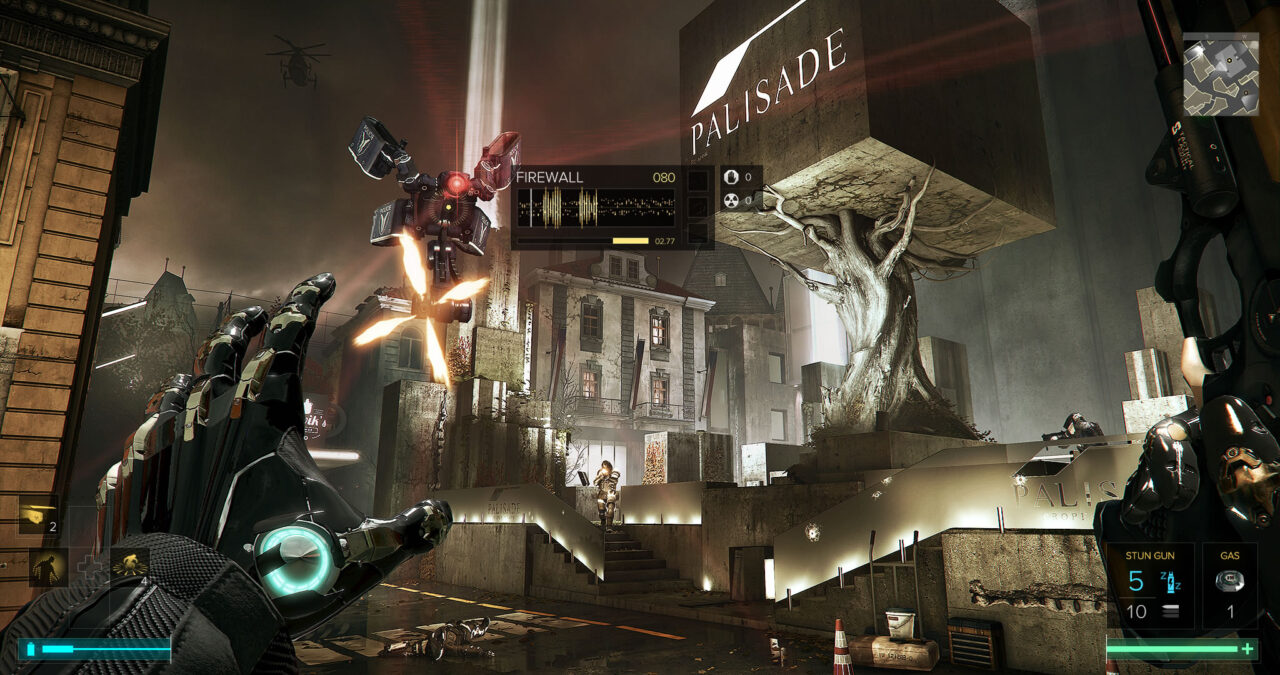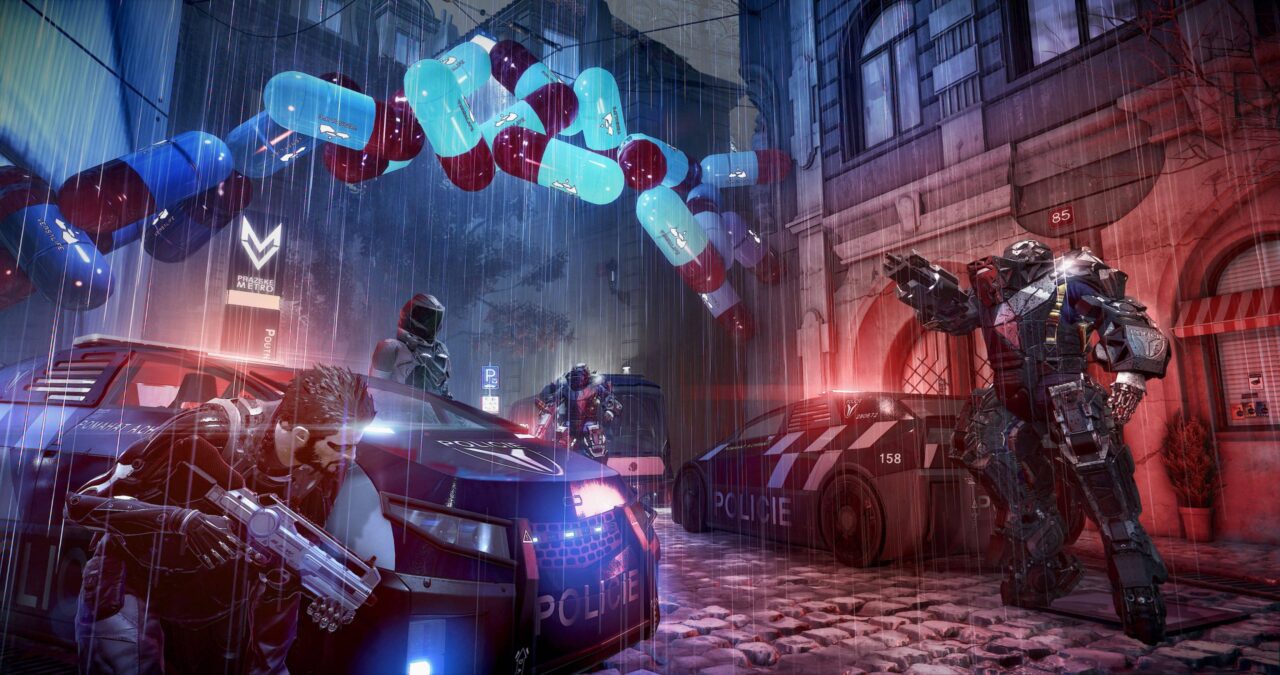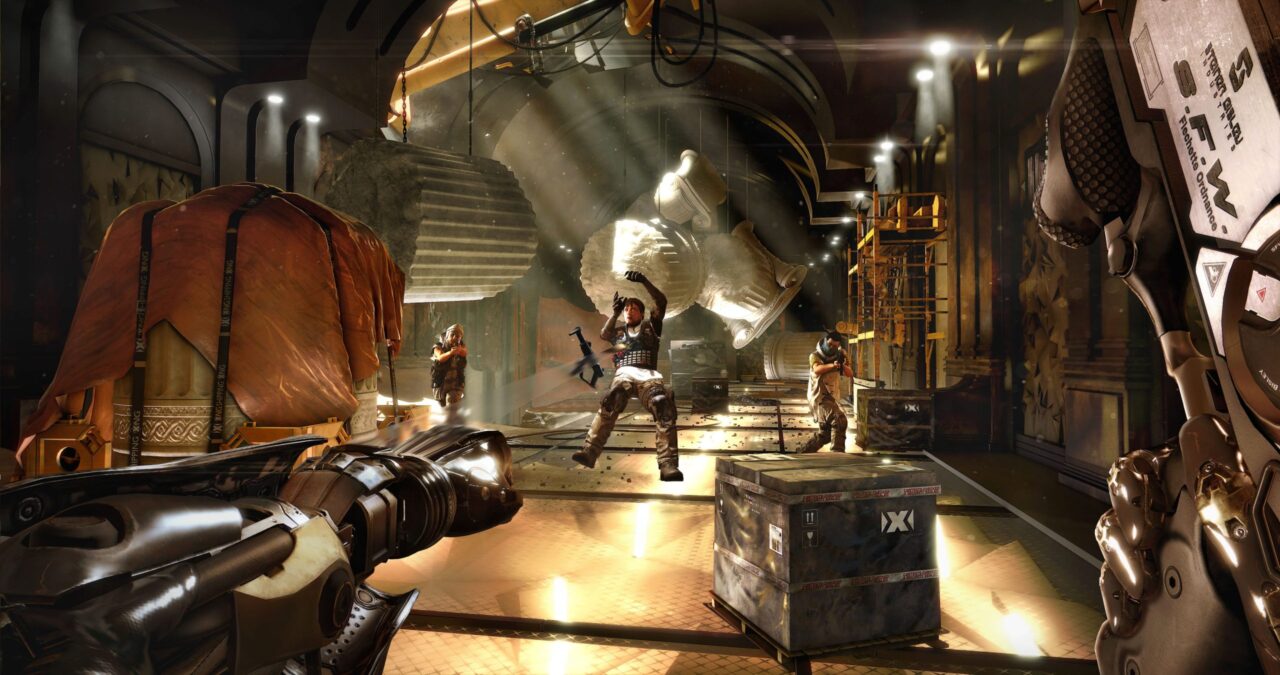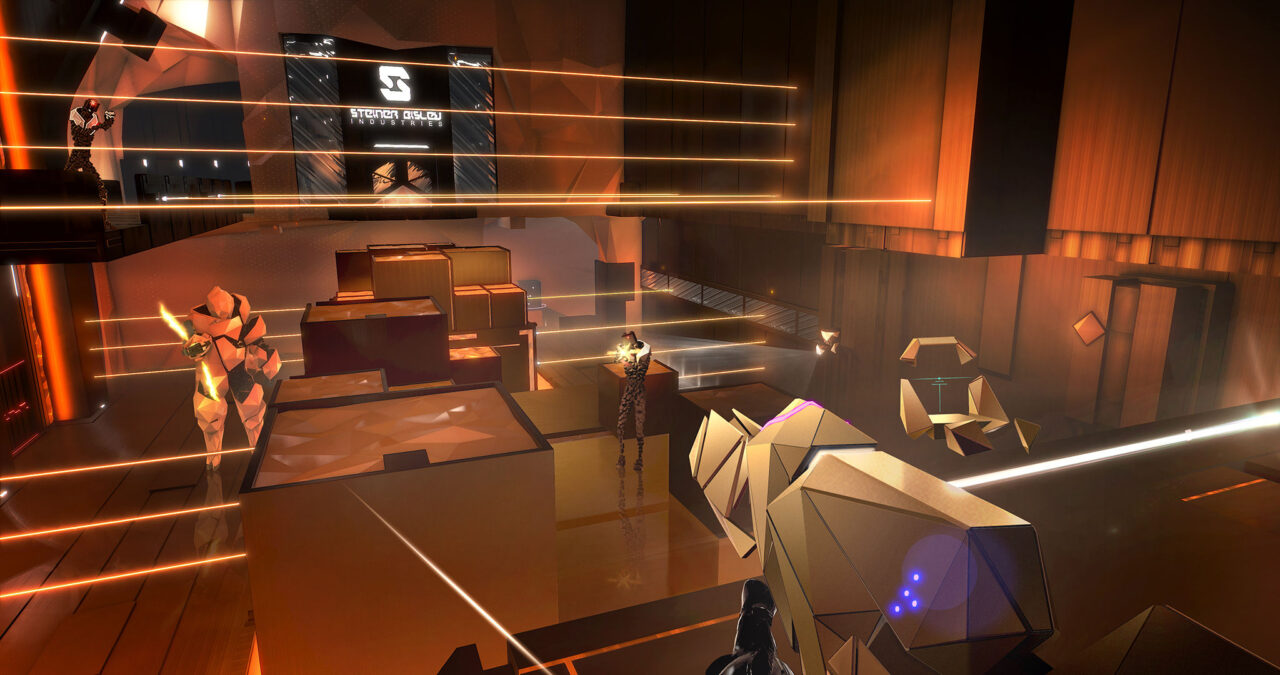In the not-so-far future of 2029 (okay, it’s slightly farther from Deus Ex: Mankind Divided’s 2016 release), the world is still reeling from the “Aug Incident” that struck two years earlier, as depicted in Deus Ex: Human Revolution (2011). Humans—or “naturals”—are disconcerted and distrustful of their mechanically augmented brethren, Augs—or, derogatorily, “clanks”—and even Aug-progressive cities have become volatile police states filled with armed guards and forcible checkpoints. Mankind is indeed divided. Gruff Aug protagonist Adam Jensen is back, now working for the Interpol group Task Force 29 while playing double agent for the underground rebel group the Juggernaut Collective. Agent or hacktivist; those juicy roles are ripe for playing, as you can choose just how “punk” you want to be in this impressively written cyberpunk setting.
When I played Human Revolution in 2011, I was annoyed by Adam’s gravelly voice and seemingly tryhard toughness, but I realize now that the market of no-nonsense military types was simply oversaturated in the PS3 era. Adam really grew on me within a few hours of Mankind Divided for how competent and sharp he is. No matter the choices one makes in the semi-branching storyline, his dialogue is informed and convincing, making me feel like the smartest guy in each room. Not only that, looking beyond some of the action movie banter with MacReady in the opening mission and the dialogue of the boring, one-note villain (no spoilers who that is), the game is intelligently written, including a very wry sense of humour unfortunately reserved for sidequests. If games like Cyberpunk 2077 are aping the edginess of, say, William Gibson’s landmark novel Neuromancer (1984), the Adam Jensen Deus Ex games are closer to Gibson’s later, more grounded novels like Pattern Recognition (2003). It’s rated “M” for mature less in a drugs-and-killing way and more in a techno-conspiracy, kids-will-leave-the-room-with-disinterest way, and I appreciate it more in the near-decade since its release.
Gameplay-wise, Mankind Divided is very similar to the systems revolutionized in Human Revolution. You generally infiltrate army compounds, banks, and big tech offices, choosing to go lethal or non-lethal, stealthy or guns and robot fists blazing. I opted for the “shooter” control scheme (the others seemed nonsensical to me), though the emphasis is less on blasting and more on the “immersive sim” elements, a term I’ve seen increasingly thrown around for story and systems-heavy shooters like the BioShock, System Shock, and Dishonored series, with the latter playing very similarly to Deus Ex. Going stealthy and non-lethal the entire game (I zapped, tranqed, knocked out, but killed not a single soul) meant that I spent a lot of time crawling through vents and hacking doors and personal computers. RPG elements, aside from dialogue choices and commanding plot direction, come in the form of slotting augmentations for Adam using “Praxises” gained by leveling up. You can level up your x-ray sight, strengthen your arms for melee moves and moving heavy items blocking vents, augment your lungs with a rebreather to avoid gas, and so on. It’s worth noting that though the game’s 12-hour or so story feels perfect for replays with new abilities and styles, nothing is stopping you from switching up your playstyle at any time, if the urge to kill so compels you.
Every skill from Deus Ex: Human Revolution is present, and you even get to play with the full shebang in the opening mission’s ‘abilitease.’ New to Mankind Divided are more experimental abilities like the Icarus instant dash that overclocks your system, meaning you must sacrifice and forever block out another experimental ability to rebalance yourself. You only need a few Praxises to fully level most skills, which means that you can very quickly play exactly how you want, but this also means that the latter half of the game’s leveling feels less important, and the difficulty of the second half drops immensely. Going silent and nonlethal was extremely frustrating for me during the mid-campaign ARC infiltration mission in the Aug shantytown Golem City (and changing difficulty does little to nothing to affect stealth), but the final few missions were laughably easy, to the point where I non-lethally dispatched the final boss within seconds. The enemies don’t really get tougher, and the security systems don’t really change—Adam just gets stronger. Oh, and those widely panned boss battles from Human Revolution? Gone here, and good riddance.
While the Deus Ex series has always had you globetrotting mission to mission, Mankind Divided is a relatively small-scale story taking place mainly in the city of Prague, with a few major story missions taking you to other notable countries I won’t spoil. Prague in-game is a unique and fully realized setting, with tons of believable near-future details and just enough real-world accuracy. I just happened to have visited Prague a month before playing and was impressed with the game’s visual touches, like the red slate rooftops in some neighbourhoods and the skyline of Prague Castle and Charles Bridge in the distance. Prague is an open setting, and in terms of size, it’s what you’d call an inch wide and a mile deep, considering the variety of approaches you can take with everything. Between major story missions that transport you to locales familiar and exotic, you can find side missions in Prague with as much, if not more, content than the main missions. These get locked off when you continue the main story, but the game will warn you when it’s your last chance to complete certain side missions. Be warned, many later missions build off your completion of those earlier, so if you want to see everything, you must do all the side missions in Prague as they become available.
Prague itself and the story missions in general are very tightly designed. The timing of things like door hacking, security camera (and turret) pans, and guard patrols line up beautifully so that you’ll always face a challenge unless you play this thing loud like Call of Duty, in which case a lot of difficulty and design are trivialized in my opinion. Levels have a nice sense of verticality, and enemy sightlines are realistic and unforgiving, meaning simply crawling in a vent or perching just above baddies will do nothing to hide you. The levels are designed brilliantly, and most skills revolve around your interaction with the environment—busting down breakable walls, say. Then, too, there is the way the camera switches to third person when you press up against a wall for stealth, and your HUD will show walls you can command Adam to run to. The opening mission in Dubai does well to tutorialize the basics, though later elements of the game are poorly (and sometimes never) explained, like what the various items in the hacking minigame do or how to deal with laser tripwires, in which case there’s an annoying sense of trial-and-error for people like me who are rusty with the series. You can save almost at any time, which I recommend you do if you don’t want a single misstep to completely ruin your sneaky infiltration.
For the soundtrack, composer Michael McCann returns from Human Revolution, joined now by Sascha Dikiciyan (who contributed to Mass Effect 2 and ME3, which sound quite similar to this game) and Ed Harrison. The soundtrack is musically less melodic and theme-driven than Human Revolution, but I love the more ambient, moody way it heightens Mankind Divided’s tense setting, becoming more agitated and rock-influenced as the action ramps up. I’d call both Adam Jensen Deus Ex soundtracks underrated gems that far surpass the sci-fi soundtracks of Hollywood in the past fifteen years. Mankind Divided’s sound design is sleek yet impactful when clocking soldiers in the face or stun-gunning enemies. The voice acting, too, holds up excellently for the main cast, especially Adam, TF29 Director Jim Miller, and sullen-tempered pilot Chikane. Enemy banter, including that from the main villain, is typical of game thugs, from the pseudo-Eastern European accents to the hilariously passive-aggressive state police (“Watch yourself, clank!”).
Aside from the main story, Breach mode is an online-connected series of challenge rooms visually and conceptually similar to Metal Gear Solid’s VR Missions. This mode is serviceable considering it’s more Deus Ex gameplay, but it’s entirely skippable and its absence won’t negatively affect your experience. The companion app, aspects of which occasionally rear its ugly PS4-era head, has also been defunct for years, but again, that won’t affect you in the slightest. If anything, the controversial DLC and microtransactions that haunted the game’s original launch (in a very cyberpunk megacorporation kind of way, I might add) are now forgotten and inconsequential ghosts in the machine, allowing the campaign to stand more proudly on its own.
As said before, even though this game has been out for nearly a decade I’ll avoid story spoilers, but know that it has writing and world-building worth experiencing. The ending, unfortunately, is rather abrupt and unfulfilling, clearly leading into a third Adam Jensen Deus Ex game that I fear we shall never see, considering the tragic handling of this franchise by those who’ve passed developer Eidos Montreal from hand to hand. Though it doesn’t propel the series forward in the way Human Revolution did, everything in Deus Ex: Mankind Divided is finely improved, finely tuned, and holds up a console generation later. It’s a great game on its own, but ending the Deus Ex series this way is akin to ending a great song at the bridge.






